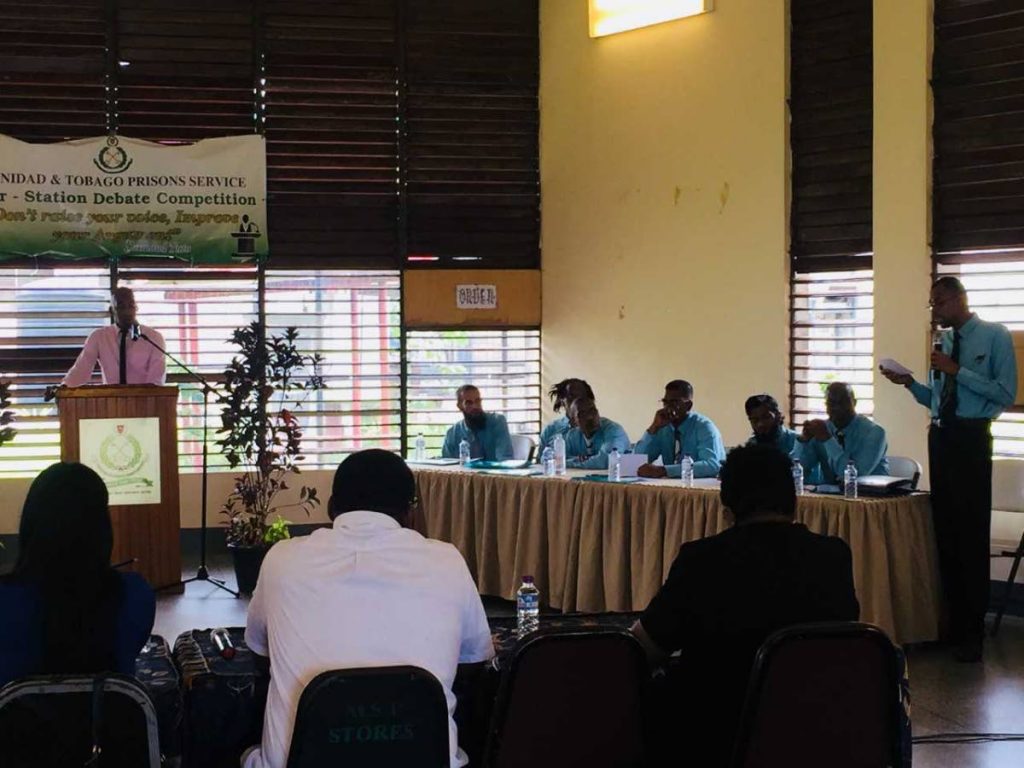Prison debate ends in drama

UNEXPECTED drama and shocking results defined the semi-final round of the prison inter-stations debates when Port of Spain (PoS) Prison faced Maximum Security Prisons (MSP) on August 17 and Golden Grove Remand challenged Carrera on August 20.
Dressed in bright yellow shirts, PoS Prison, the affirmative team, shone with their arguments favouring rehabilitation over punishment in prison.
Looking spiffy and professional with their ultramarine blue shirts and matching ties, MSP argued the negative side, arguing for punishment over rehabilitation.
Mark Hernandez, who opened for PoS, pointed out that everyone does something wrong in life and rehabilitation is the key to successful integration back into society. He fashioned a compelling, well-structured argument.
MSP’s opener Arnold Ramlogan argued punishment was necessary for social order and that inmates must face consequences.
MSP’s argument didn’t always appear clear and cohesive, but they proved once again to be masters at hurling impactful lines that the judges found noteworthy.
PoS’s ability to develop and support an argument proved impressive again as Akili Charles built on Hernandez’s argument.
Charles pointed out to the judges that MSP would try psychology on them, singling out heinous crimes for the shock value rather than looking at the overall picture and benefits of rehabilitation.
MSP peppered PoS with questions, but PoS refused to be intimidated.
This debate came down to the closers. Netfa Felix delivered a cohesive closing, but it lacked the visual impact he had produced in the past.
With unmatched dramatic flair, Kester Benjamin presented a clinching closing statement filled with drama and a searing visual image of himself in court watching his mother breakdown at his conviction. This he presented as an epiphany of how much he had made other mothers suffer, all to drive home the point that punishment is paramount to rehabilitation, because “there is nothing more dangerous than an educated criminal.”
This conclusion brought a collective gasp from the crowd. For his shocking, but effective argument, the judges rewarded Benjamin the top points for debater of the day.
Confident they had won, PoS sat with mouths agape when MSP emerged the winner with 346 points to PoS’s 333.
Confusion reigned as a judge questioned the scoring and a recount occurred. One judge’s scores had been assigned to the wrong team, and when the results were announced the second time – the two teams praised by the judges for their passion, articulate vocabulary, respect, presentation, research and exemplary team effort – the correct score showed a one-point difference: MSP 340 and PoS 339.
The excitement continued in the second semi-final, when Golden Grove Remand challenged Carrera over the decriminalisation of marijuana.
Carrera argued against decriminalisation. Remand appeared to take a page out of MSP’s playbook, dressing the part of confident professionals in forest-green shirts – green of course because they were the affirmative team arguing in favour of marijuana.
Remand’s opener Kerry Swann laid a solid foundation for the affirmative team’s arguments. It was an especially noble effort because he had been in hospital during the week.
Philbert Foster, who has emerged the top debater in the entire competition, countered with a brilliantly constructed argument that began with an impactful anecdote about his brother who, at 14, went down the wrong path after he began to abuse marijuana.
“I lost my brother on that day,” said Foster. Weaving emotive imagery through perfect diction, he compelled the audience to listen to his argument.
In the question-and-answer segment, Remand proved once again it has the most adept questioner in Jahlion King.
He builds support for his team’s argument with a wide range of pointed and well-focused questions that allow opponents no wiggle room. On this day, he asked – and even demanded – statistics from his opponents to back up their claims. King controls the questioning with aplomb.
Carrera’s downfall in the question section was an attempt to force the affirmative side to concede that marijuana was a major factor in traffic accidents.
Both sides impressed with extensive research that heavily weighted their debates towards statistics rather than emotion, which impressed the judges.
In the end, a jubilant Remand Yard – arguably the biggest underdog in the competition because of its lack of facilities – won with 439 points to Carrera’s 411.
The final four teams reflect the dedication and enthusiasm of exemplary prison officers in the programmes department, who have gone above and beyond the call of duty with long hours of preparation for this event. Their work reflects distinct attitudes that define their teams:
Avalon Ramsahai and Bharat Seetahal instil pride and confidence in Remand; Dirk Ravello and Stephen Farrell promote dedication to research and structuring an argument in PoS Prison; Majoon Nancoo and Sherwin Johnson cultivate unshakeable confidence and intellectual zeal in MSP; and Imran Khan and Bennis Sebro create a unique brand of creativity and tenacious teamwork in Carrera.
The finals of the inter-station prison debate will pit MSP against Golden Grove Remand with PoS Prison facing Carrera for third place on September 19 at YTC.


Comments
"Prison debate ends in drama"